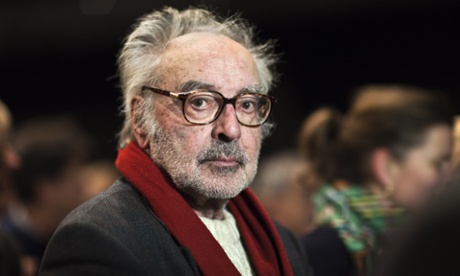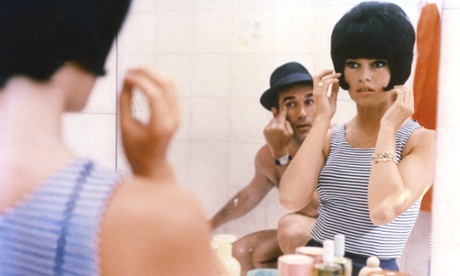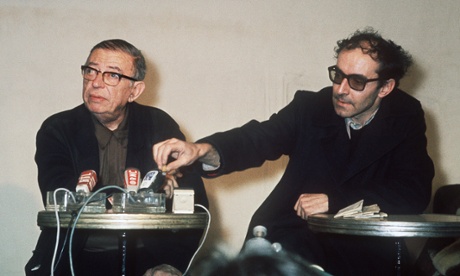
The last great 20th-century modernist is dead. At the last, Jean-Luc Godard had become like a charismatic but remote cult leader; it was as if Che Guevara had evaded assassination and grown old hiding out in the Bolivian jungle: less visible, less important, but still capable of masterminding from afar those bank-heists and spectacular acts of armed resistance which reminded people of his revolutionary vocation. Godard was at first hero-worshipped and adored and then shrugged at and yawned at: as unthinkingly mocked and jeered at as he was once unthinkingly swooned over. He was influential in the sense that the French New Wave shook up Hollywood and all film-makers; his own rarefied experimental procedures have nowadays migrated to video art.
Godard exploded on to world cinema with À Bout de Souffle, or Breathless, in 1960, from a treatment by François Truffaut, the story of a young American girl in Paris, played by Hollywood star Jean Seberg, and her doomed affair with a sexy tough guy on the run, played by Jean-Paul Belmondo. Godard tore up the rule book without troubling to read it: his wild digressions, offbeat dialogue scenes, vérité location work, non-narrative excursions and “jump-cuts” – the inspired, semi-deliberate wrong editing created by an intuitive, untutored auteur.

The 1960s were his glorious period, when images and slogans could change the world; he was making films with breathtaking fluency and speed. Godard was garrulous, effortlessly fashionable, the epitome of continental cool. That picture of him holding up a roll of film and inspecting it is pretty well iconic – but grumpy unconvinced types wondered if he mightn’t be able to look at it better if he took off the dark glasses. Sexual morality and the agonising impossibility of intimacy and love were his themes, combined with cerebral discussions of politics. Bande à Part (1964) and Two or Three Things I Know About Her (1967) have a wonderful energy and style: they jump for joy and defy gravity on the way down.
But my favourite Godard movie of that period, actually favourite Godard movie ever, is his Une Femme Mariée (1964), a mature yet approachable masterpiece, comparable to Agnès Varda’s Cléo From 5 to 7. Macha Méril is the stunningly beautiful Charlotte, a young married woman conducting an affair with a handsome actor. It is intensely erotic, with a pure freewheeling brilliance; it’s a digressive cine-essay and a movie-flaneur’s wander through Paris – where else? It has a Warholian interest in magazine interviews and the iconography of advertising, a fetishistic rapture for underwear. Godard also uses subtitles for what Charlotte is thinking as she eavesdrops on two women talking about sex: prefiguring Woody Allen’s Annie Hall. It is one of the sexiest, strangest films ever made and I prefer it to the more self-importantly cinephile film Le Mépris, or Contempt (1963) with Brigitte Bardot.

Often a Godard film like Pierrot le Fou (1965) would be bafflingly wild, almost incoherent, absorbing into itself some of the disputatious disorder of the shoot itself: action would be frenetic, almost farcical – a satiric comment on the childishness of Hollywood melodrama – and yet there was always time for long intellectual debates. Godard would always return to militarism and imperialism, to French guilt and shame about the war, to the horrible shadow of the death camps, and of course Vietnam, that key 60s issue which sent Godard into a conceptual thicket of radical Maoism and leftism from which he never entirely emerged.
Uniquely among film-makers, he was the director who was also theorist, critic, maître à penser, experimentalist: a radical who was the first film-maker in the medium’s short history seriously to think about what cinema was and what it meant. But bafflingly, Godard would not celebrate cinema as an art form in its thrilling infancy but behave as if it was all over. The final credits for Weekend (1967) read: “End of story – End of cinema.” He was a little like the literary critic George Steiner in this regard, who controversially declared that tragedy was dead, or the German language was dead. Godard provocatively and exasperatingly liked to declare that cinema was dead – a haughty après moi, le déluge affectation, which never stopped his own rampant productivity. Godard became the mysterious, exasperating magus who wanted to make, not films, but “cinema”, somehow to liberate the sound and image from the four boundary-walls of the screen. He was crucially inspired by the great critic André Bazin of Cahiers du Cinéma, beginning his own career as a critic in that remarkable journal, a founder of the New Wave movement, when to criticise was to intervene decisively in cinema, and to make films was to intervene in life itself. Cinema was a seizing of reality.

Comparisons are irresistible. Godard was cinema’s sternly judging Robespierre, or he was a John Lennon – Paul McCartney being François Truffaut, that more emollient and commercially-minded New Wave comrade with whom Godard was to fall out. Or maybe Godard was the medium’s Socrates, believing that an unexamined cinema was not worth having.
Godard’s savant gift for divining the zeitgeist never quite deserted him. His movie Goodbye to Language, gnomically discursive and enigmatic as ever but playfully enlivened with 3D, was thought of by American critics to be the best film of 2014. His Film Socialisme (2010) was an another collage of images and ideas, showing people on holiday: stateless, alienated. Much of the film took place on a cruise ship. What was Godard saying about socialism, we wondered? Then history itself took a hand. The cruise ship on which Godard was filming was in fact the notorious Costa Concordia, which capsized in a spectacular disaster in 2012; many commentators argued that the tall design, to accommodate more and more paying customers, makes pleasure craft of this sort top-heavy. For me, in these later movies, Godard’s camera lens is almost like an impossibly powerful telescope. It is as if he is looking at human beings from a long way away, maybe from another planet.

Many simply gave up on Godard, or were embarrassed at their extravagant former hero worship of a 60s figure, who declined to sell out, or grow up, or make commercial movies, or drift to the right, but carried on in the same old severe way: although his sexual politics started to look troglodytic and his loathing of Israel appeared sometimes to cross the line into antisemitism. For many, his mature masterpiece after Breathless was the epic eight-part video documentary project Histoire(s) du Cinéma (1988-1998) – a staggeringly ambitious textual collage of quotation, a quilt of clips with which Godard creates a personal landscape of cinema, a labour of passionate cinephile love. Before this, I myself had never found much that was moving, exactly, in Godard – though plenty that was formally brilliant and intriguing and exciting. Yet there is something mysterious and moving in the Histoire(s) du Cinéma. There is, and was, no one like Godard, and his loss makes this a sombre day. It’s a day to watch Une Femme Mariée to be reminded of how exciting and sexy his films were.







